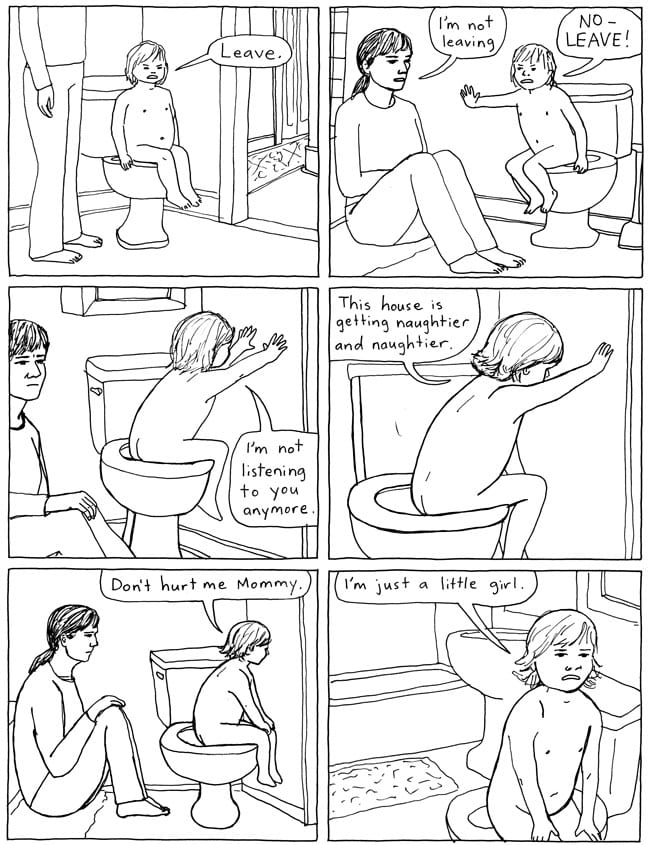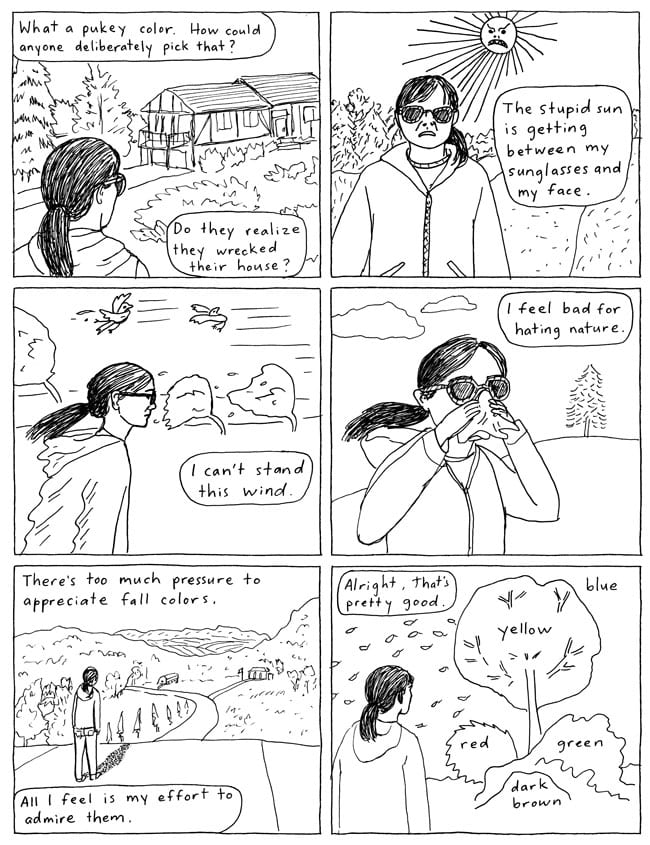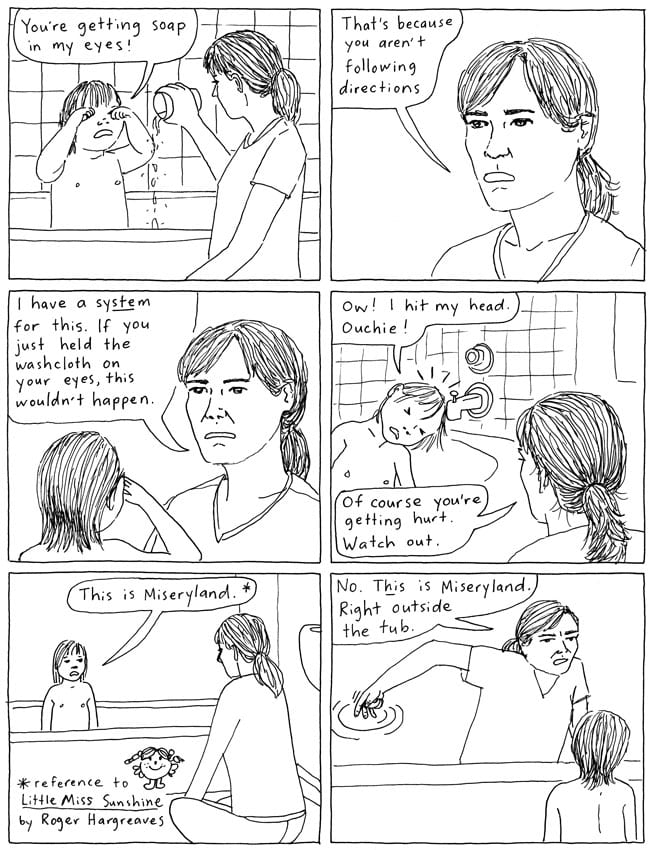Miseryland, Keiler Roberts’ third paperback collection of autobiographical comics from her zine, Powdered Milk, is an invigorating blend of observational comedy, quiet domesticity, and existential angst, captured in realistic line drawings that have a slightly rough, appealingly improvised feel. Though delightfully funny, these stories have a melancholy running underneath, a sense of the fragile order of existence and how quickly emotional equilibrium can be upset by small incidents, unwanted exchanges, doubt, or self-recrimination. With a keen ear for dialogue and nuance, Roberts captures human nature in all its quirky contradiction.
Surrounding Roberts are her cast of characters: her supportive husband Scott (also a cartoonist), her energetic four-year-old daughter Xia, her sweet-natured, loving parents, and Crooky, the little family dog. Most action centers on the day-to-day of the Roberts household, especially involving Roberts and Xia. Like most toddlers, Xia can be quite capricious, alternating between straightforward affection ("You’re a nice friend to me. I like you") and aggression ("I’m trying to bite you and you won’t let me!"). Her child’s-eye observations and odd little notions and fantasies are highly amusing, and Roberts' straightforward docu-drawing presentation and exquisite timing makes them all the funnier.
Husband Scott is generally depicted as the straight man: solid and dependable, someone Roberts can lean on in times of trouble or anxiety. But he’s direct with her too, and displays a wry sense of humor. At one point, Roberts, at the bathroom mirror, says to him, "I have these weird sores inside my nose. I don’t know what they are. Can you look at them?" Scott's reply: "God no! That’s the last thing I would do. I will never look at them." In another scene, he comments derisively on the seeming over-supply of bananas on the kitchen counter. Roberts, annoyed, assures him she’s using them for banana bread: “It’s not ‘excessive’ when you use them all.” Scott: “Anyone who would’ve seen them would’ve said the same thing. They would’ve asked how many gorillas lived here.”
Near the end of the book, Keiler and Scott visit her parents in Wisconsin. Roberts’ mother displays a penchant for buying things on eBay, for list-making (“I love checking the last thing off a long list”), and for general tidiness and order. When Roberts tells her a pen has dried out, her mother happily takes it from her: “Oh good. I love it when that happens. Now I get to throw it out.” She may be the most endearing character in the book.
The awkwardness of human communication is a recurrent theme. In some strips, Roberts makes plain her difficulty connecting with others, though often playing it for laughs. One caption describes her anxiety about traveling: “I can’t understand anyone, anywhere in the world.” To illustrate, she offers this exchange with an Australian man:
Man: “What time do you eat brekky, mate?”
Roberts: “What?”
Man: “Are the mossies biting you?”
Roberts: “What?”
Man: How was your flight?”
Roberts: “What?”
In another strip she becomes involved in a polite conversation with a woman while waiting for a train (naturally, the woman initiates it). Although the conversation (about sweaters) is pleasant enough, when Roberts' train comes, she’s afraid she'll have to sit with the woman for the entire trip ("This is going to be awkward."), and is relieved when the woman goes her separate way. It’s a simple scenario that any introvert will sympathize with.
Though her dry humor is immediately winning, there is also a detached, bemused quality to Roberts’ work. She discusses her struggles with bipolar disorder casually, as well as her frequent anxiety: she frets about nature, travel, child-seats, comics shows, and encounters with strangers. Even something as innocuous as a bowl of mixed nuts can spark concern: “Be careful,” she tells Xia. “This whole snack is choking hazards.” But there’s always Scott or her mother lending support—Xia too, when she’s not being ornery. “Thank you for drawing that Mommy,” she says upon seeing a drawing Roberts did of Xia with Crooky.
Robert’s work has its own distinct rhythm. Her somewhat eccentric pacing and layouts of some pages took me a bit of time to get used to. For example, she occasionally presents a six-panel page with some of the panels relating sequentially and others standing alone, effectively turning these pages into montages. It is this kind of innovation that really makes her work stand out in a crowded field of autobio and memoir comics. I thoroughly enjoyed this book and look forward to reading much more from this uniquely talented cartoonist and her delightfully idiosyncratic family.











